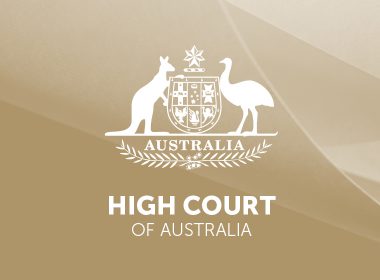Key decisions
- Palmer v Western Australia [2021] HCA 5
- Wigmans v AMP Limited & Ors [2021] HCA 7
Constitutional law
Section 92
In Palmer v Western Australia [2021] HCA 5 (24 February 2021) the High Court was required to consider whether the Quarantine (Closing the Border) Directions (WA) (‘Directions’), which effectively closed the West Australian border from 5 April 2020, infringed s 92 of the Constitution.
The Police Commissioner for Western Australia issued the Directions under s 67 of the Emergency Management Act 2005 (WA) (‘the Act’). Section 67 allows an authorised officer to (among other things) ‘direct or, by direction, prohibit, the movement of persons … into, out of or around an emergency area or any part of the emergency area’ during a state of emergency for the purpose of ‘emergncy management’. A Minister may declare a state of emergency under s 56 of the Act provided that the conditions enumerated under s 56(2) are met. The Minister declared a state of emergency under the Act on 15 March 2020 (after the World Health Organisation declared COVID-19 a pandemic).
The challenge to the Directions was brought by Clive Palmer (‘Palmer‘) and Mineralogy Pty Ltd, a company of which Palmer is chairman and managing director (‘the plaintiffs‘). Palmer regularly travelled between WA and his home in Queensland for business purposes. Palmer applied for, and was denied, an exemption under the Directions. The plaintiffs subsequently brought proceedings in the original jurisdiction of the High Court, in May 2020, seeking a declaration that ‘either the authorising Act and/or the Directions are invalid, either wholly or in part … by reason of s 92 of the Constitution’. Section 92 of the Constitution provides, relevantly, ‘trade, commerce and intercourse among the States … shall be absolutely free’. The plaintiffs argued that the Directions imposed a burden on the freedom of intercourse among the Australian people by prohibiting cross-border movement of people. Alternatively, the plaintiffs argued that the freedom of trade and commerce guaranteed by s 92 is contravened because the Directions imposed an effectively discriminatory burden with protectionist effect. The defendants (the State of Western Australia and the Police Commissioner) denied that either the Act or the Directions contravened s 92 because, they argued, neither had the purpose of economically protecting Western Australia rather they had the legitimate purpose of (and were reasonably necessary to achieve) the protection of the population of Western Australia against risks arising from emergency situations.


